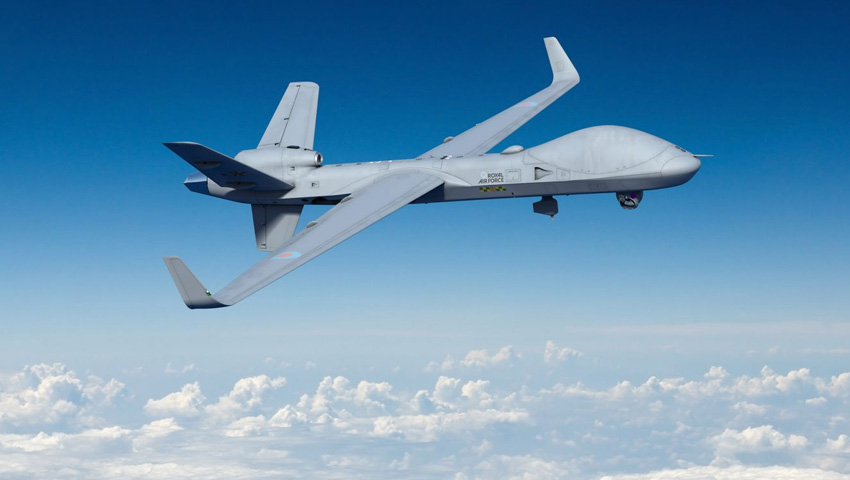UK Defence Secretary Ben Wallace has signed a £65 million ($116.6 million) contract to build the UK’s first three Protector aircraft – the first UK operated system capable of strike missions anywhere in the world.
After a successful development phase, Protector is set to enter service by mid-2024, meaning that the remotely piloted air system (RPAS) will deliver a step-change in capability for the RAF.
Protector is the world’s first certified RPAS, enabling it to fly in busy, unsegregated airspace, including civilian airspace, thanks to its ground-breaking ‘sense and avoid’ technology.
The contract was announced by Defence Secretary Ben Wallace at the virtual 2020 Air and Space Power Conference, with Secretary Wallace stating, "The UK is proving once again that we are a world leader in defence technology. Protector will provide the RAF with vast global reach, meeting the UK’s defence and security needs for decades to come, and provides another increase to the unmanned inventory for the Armed Forces."
The Protector platform has the ability to fly consistently for up to 40 hours and will offer the RAF vastly improved armed intelligence and reconnaissance sorties.
The innovative fleet will also have advanced anti-icing and lightning protection, providing the RAF with unprecedented flexibility to operate in extreme weather conditions.
"This aircraft will upgrade a whole range of lethal capabilities allowing us to control, protect and manage the battlespace from the air for hours on end," Secretary Wallace added.
Protector also comes with enhanced data links and will carry next-generation, low collateral, precision strike weapons – the UK-made Brimstone missile (MBDA) and Paveway IV Laser Guided Bomb (Raytheon UK).
The RAF's fleet of Protector will replace the current Reaper RPAS force, will be deployed in wide-ranging intelligence, surveillance, targeting and reconnaissance (ISTAR) operations from its base at RAF Waddington, Lincolnshire.
The contract follows a successful development phase by manufacturers General Atomics Aeronautical Systems Inc., which will build the first three Protector aircraft, plus three ground control stations and other associated support equipment.
Sir Simon Bollom, CEO of Defence Equipment and Support, added, "I am delighted to announce that we have got Protector production on contract. The DE&S team have demonstrated their remarkable resilience and overcome considerable challenges to ensure this significant program remained on track."
It also includes an option to build 13 more aircraft and four ground control stations, which will complete the current planned fleet of 16 aircraft, more than doubling the capability currently provided by Reaper.
"Their efforts and the collaborative commitment from industry means that the RAF can still look forward to the delivery of the cutting-edge Protector and the step-change in capability that it brings," Sir Simon added.
Meeting stringent NATO and UK safety certification standards, the aircraft could, if requested, operate in civilian airspace to support civilian agencies in the UK, for example, in search and rescue and disaster response missions.
Project AIR 7003 will provide the ADF with an armed medium-altitude, long-endurance (MALE) RPAS that will include aircraft and ground control stations (GCS) that will be fully inter-operable with Australia’s allies.
Each of the Reaper variants, including Australia's MQ-9B are operated from a common ground control station and are air-transportable by RAAF C-130 Hercules and C-17 Globemaster airlifters, or independently deployable, providing Australian expeditionary forces with a highly capable, reliable and persistent close-air-support, intelligence, surveillance and reconnaissance asset.
GA-ASI, an affiliate of General Atomics, is a leading designer and manufacturer of proven, reliable RPAS, radars, and electro-optic and related mission systems, including the Predator RPA series and the Lynx multi-mode radar.
With more than 5 million flight hours, GA-ASI provides long-endurance, mission-capable aircraft with integrated sensor and data link systems required to deliver persistent flight that enables situational awareness and rapid strike.


